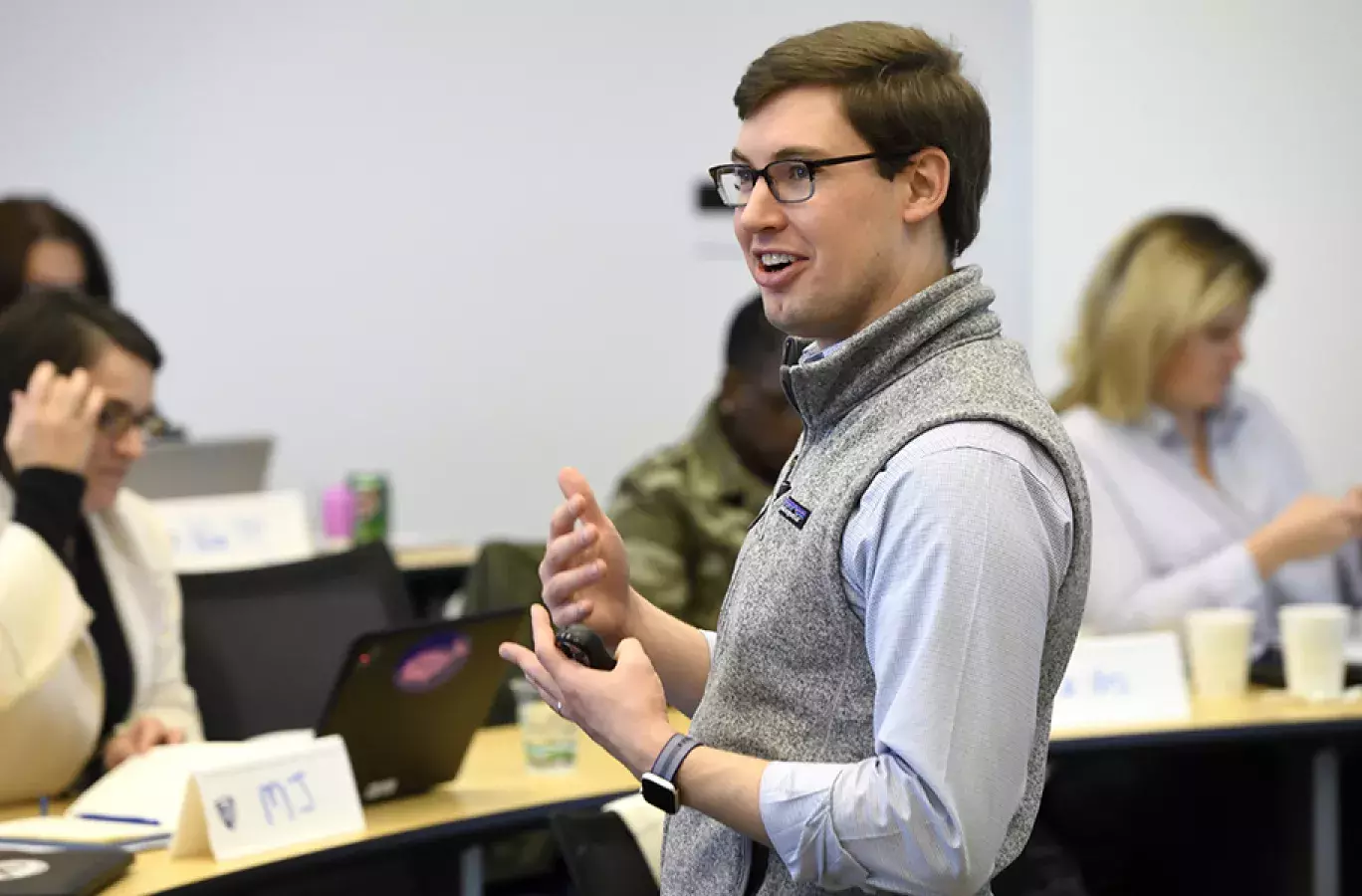Foundations of Leadership and Management

Course Features
Lead with purpose, manage with practice
As the required foundational course for the Executive Certificate in Organizational Leadership (but open to any Carey Executive Education participant), this course exposes participants to the fundamentals of leading and managing in teams or units. This course equips participants to lead with purpose and incorporate core knowledge and skills from research on leadership and organizations into their daily practices. Specifically, this course focuses on helping individuals recognize their personal leadership and management strengths, effectively utilize team dynamics, motives, and incentives to enhance their leadership impact, make better individual and group decisions, understand and influence organizational culture, and create a comprehensive plan for ongoing personal and professional development.
Learn the day-to-day functions of leaders and managers as you take part in hands-on, collaborative learning experience with industry peers. Explore fundamental research-based principles that you can learn and grow from whether you're a first-time manager, middle manager, or seasoned business leader. This course is grounded in social science research and taught by renowned faculty that are experts in the leadership space.
If you intend on pursuing the Executive Certificate in Organizational Leadership, we suggest you complete Foundations of Leadership and Management first.
All courses include:
Industry-leading faculty
Collaborative learning
Research-driven results
Lifelong connections
Practical applications
Custom solutions
Program Details
Who should attend
- Rising managers
- Experienced business leaders
- Current managers looking to rise to the next level of management
- Team leaders and decision-makers across industries
What you will learn
- How to identify existing leadership and management strengths and develop a growth plan
- Principles and practices for motivating and incentivizing work
- Practices for more successful individual and group decisions
- Leadership in a team environment; organizing for team success
- Recognizing and navigating organizational culture
- Research-based best practices for managing and leading in contemporary workplaces
Faculty
Brian Gunia, PhD
Professor, Johns Hopkins Carey Business School
Brian Gunia joined the Johns Hopkins Carey Business School in 2011. He is a Professor and the Associate Dean for Academic Programs. Brian studies three ways that people commonly jeopardize their careers: by acting unethically, negotiating ineffectively, and sleeping insufficiently. Instead of focusing on self-defeating choices themselves, however, he focuses on simple, theoretically-motivated measures that might enable individuals to act more ethically, negotiate more effectively, and sleep longer or better. Brian is the author of a negotiation blog called Life's Negotiable and a negotiation book called The Bartering Mindset. As Associate Dean for Academic Programs, Brian works with faculty and staff to ensure curricular excellence across academic programs. Prior to joining academia, Brian worked as a consultant at Deloitte.
Erik Helzer, PhD
Associate Professor of Practice, Johns Hopkins Carey Business School
Erik Helzer, PhD develops and applies psychological, organizational, and behavioral science insights to understand the cultivation of practical wisdom for leading in organizations. His research focuses on three facets of practical wisdom: ethical behavior and moral judgment, self-knowledge, and personal agency and adjustment. He is an Associate Professor of Management and Organization at the Johns Hopkins Carey Business School and the Executive Education Faculty Director for Leadership Curriculum.
Christopher G. Myers, PhD
Professor and Faculty Director of the Center for Innovative Leadership, Johns Hopkins Carey Business School
Christopher G. Myers, PhD (Management & Organizations, University of Michigan) is a Professor and the founding Faculty Director of the Center for Innovative Leadership at the Johns Hopkins Carey Business School, and holds a joint faculty appointment in the School of Medicine (Anesthesiology and Critical Care Medicine). His research explores questions of learning, leadership development, and innovation in organizations, specifically examining how people learn vicariously from others’ knowledge and experience at work. He focuses in particular on studying health care organizations and other knowledge-intensive work settings. Prior to joining the faculty at Johns Hopkins University, he was an Assistant Professor of Organizational Behavior at the Harvard Business School. Follow him on Twitter @ChrisGMyers.
Michelle Barton, PhD
Professor of Practice, Johns Hopkins Carey Business School
Dr. Michelle Barton is a Professor of Practice at the Johns Hopkins Carey Business School with expertise in organizational and team resilience, managing uncertainty, and interpersonal effectiveness during adversity. Dr. Barton’s work examines how groups manage dynamic and uncertain situations as they are unfolding. Drawing from wildland firefighting, high tech entrepreneurship, expedition racing and military operations, her research considers how groups make sense of ambiguous situations, how they coordinate, learn and share knowledge in the midst of confusion and how they mitigate and recover from adversity. She is especially focused on the relational dynamics that enable these practices. Dr. Barton’s research has appeared in Harvard Business Review, MIT Sloan Management Review, BMJ – Leader, Academy of Management Review, Organization Studies, The Journal of Contingencies and Crisis Management, Human Relations, Organizational Psychology Review and several edited collections. She is a well-regarded speaker, and has presented her work at venues such as NASA (International Space Station flight directors), the U.S. Army Medical Command, Johns Hopkins University Patient Safety Conference, West Point, Children’s Hospital Association and Boston Medical Center among others.



